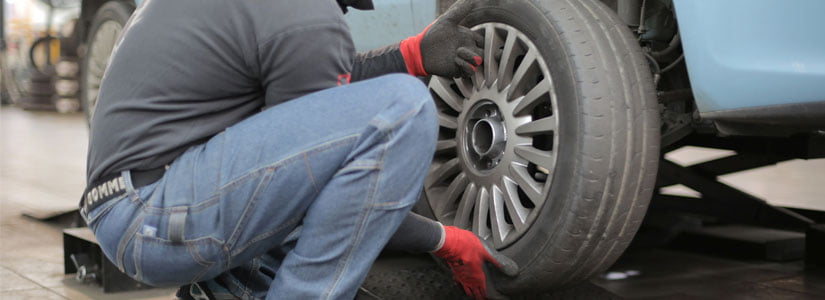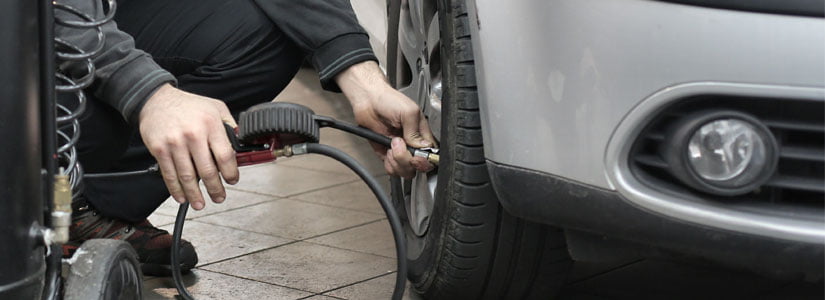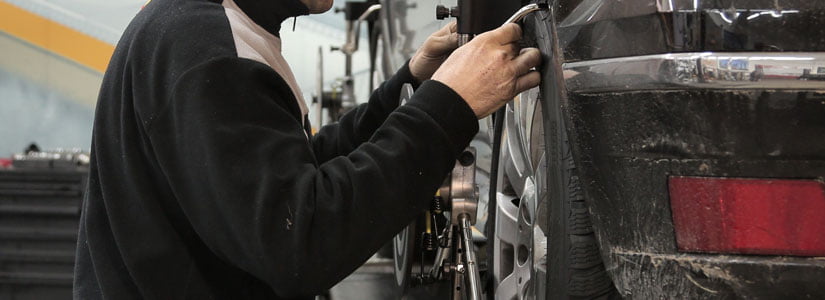Hours of Operation
- Monday 7:00 - 6:00
- Tuesday 7:00 - 6:00
- Wednesday 7:00 - 6:00
- Thursday 7:00 - 6:00
- Friday 7:00 - 6:00
- Saturday Closed
- Sunday Closed
Tires and Wheels
Your tires are the critical link between the vehicle and the road. Tires are designed to support the vehicle’s weight, maintain and change the direction of travel, absorb road shocks, transmit traction, torque and braking forces to the road surface.

Tire Pressure
Keeping your tires properly inflated to the automaker’s recommended pressures is an integral part of tire maintenance. Improperly inflated tires can negatively affect braking, steering and handling, which can be especially dangerous in an emergency stop or an evasive maneuver.
Under-inflated tires reduce fuel economy and causes rapid outer edge wear. It can also cause the tire’s sidewall to flex more, which creates heat and accelerates tire wear and can lead to a blowout.
Over-inflated tires can cause a stiffer ride and rapid center wear. Maintaining proper tire inflation will increase the life of your tires, give you optimal fuel economy, and provide better braking, steering and handling.

Tire Replacement
AutoWorks inspects your tire’s overall condition, which includes inspecting for cracks, punctures, blisters or bulges in the sidewall, and tread depth. Tire replacement is recommended when your tires are approaching minimum industry standards for treadwear or are considered unsafe. Tire professionals recommend tire replacement when the tread depth is at 4/32 in wet and snowy conditions and 2/32 when used in dry conditions.
Replacing tires before they become worn out improves vehicle safety, braking, steering and handling.
Wheel Balancing
Out-of-balance wheels can cause vibrations or a noticeable shake in the vehicle. This can result in damage of the steering and suspension components, abnormal or premature tire wear, and lead to mechanical failures.
Causes of wheel vibrations include an incorrectly balanced tire-wheel assembly, a bent rim, tire runout (radial or lateral), mud or snow in the rim, or a weight distribution change as the tires wear.
Having your wheels balanced helps ensure a smooth ride and tire longevity.

Tire Rotation
Tire rotation is an essential part of tire maintenance. Tires will wear differently depending on what axle they are on, the condition of your suspension system, and your driving habits.
Rotating your tires helps ensure uniform tire wear, optimal performance and tire longevity. It is recommended to rotate your tires between 8,000kms to 12,000kms.
Tire Pressure Monitoring System (TPMS)
Vehicles equipped with a TPMS will notify the driver with an illuminated light on the dashboard when detecting an unsafe drop in tire pressure.
AutoWorks recommends having your tires, and TPMS checked if the light is on.
We include a comprehensive tire condition and tread depth inspection in our Level 1, 2 and 3 Maintenance Service Packages.
